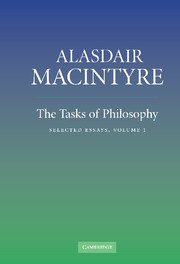Book contents
- Frontmatter
- Contents
- Preface
- Acknowledgments
- PART I DEFINING A PHILOSOPHICAL STANCE
- PART II THE ENDS OF PHILOSOPHICAL ENQUIRY
- 7 The ends of life, the ends of philosophical writing
- 8 First principles, final ends, and contemporary philosophical issues
- 9 Philosophy recalled to its tasks: a Thomistic reading of Fides et Ratio
- 10 Truth as a good: a reflection on Fides et Ratio
- Index
9 - Philosophy recalled to its tasks: a Thomistic reading of Fides et Ratio
Published online by Cambridge University Press: 05 June 2012
- Frontmatter
- Contents
- Preface
- Acknowledgments
- PART I DEFINING A PHILOSOPHICAL STANCE
- PART II THE ENDS OF PHILOSOPHICAL ENQUIRY
- 7 The ends of life, the ends of philosophical writing
- 8 First principles, final ends, and contemporary philosophical issues
- 9 Philosophy recalled to its tasks: a Thomistic reading of Fides et Ratio
- 10 Truth as a good: a reflection on Fides et Ratio
- Index
Summary
Fides et Ratio is both an encyclical about philosophy and an exercise in philosophy, a contribution to the very same debates about which it speaks. As an encyclical, it insists on the autonomy of philosophical enquiry: “philosophy must remain faithful to its own principles and methods. Otherwise there would be no guarantee that it would remain oriented to truth and that it was moving towards truth by way of a process governed by reason” (section 49 of the encyclical). And by so insisting it deliberately opens itself up to questioning. Certainly, like other encyclicals, it invites obedient assent from Catholic readers. But we would be disobedient to its distinctive message, if we did not subject it to philosophical questioning.
My own questioning is from the standpoint of a Thomist. And, since the highest praise in the encyclical is accorded to St. Thomas Aquinas, it might seem that for Thomists there should be little to question. But there is something philosophically problematic about this encyclical. For it proceeds boldly and instructively in the direction of some of the most deep-cutting and divisive issues within philosophy and then at certain points stops short, exhibiting on the one hand an evident reluctance “to demand adherence to particular theses” within philosophy and a corresponding emphasis on the legitimacy from a Catholic standpoint of a range of diverse and mutually inconsistent philosophical positions of which Thomism is only one, but also voicing unqualified approval for Thomistic realism. How are these two attitudes related?
- Type
- Chapter
- Information
- The Tasks of PhilosophySelected Essays, pp. 179 - 196Publisher: Cambridge University PressPrint publication year: 2006
- 5
- Cited by

